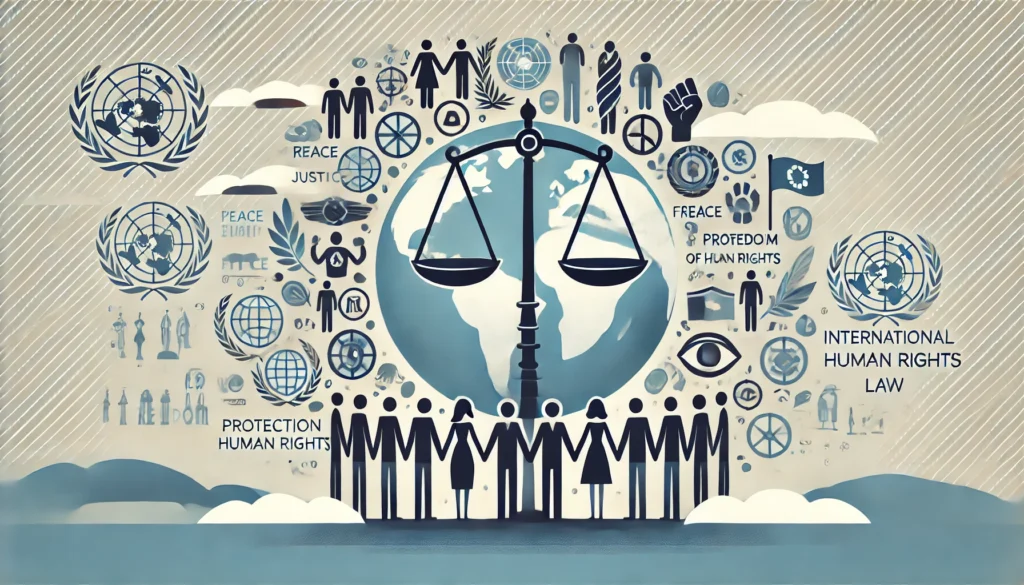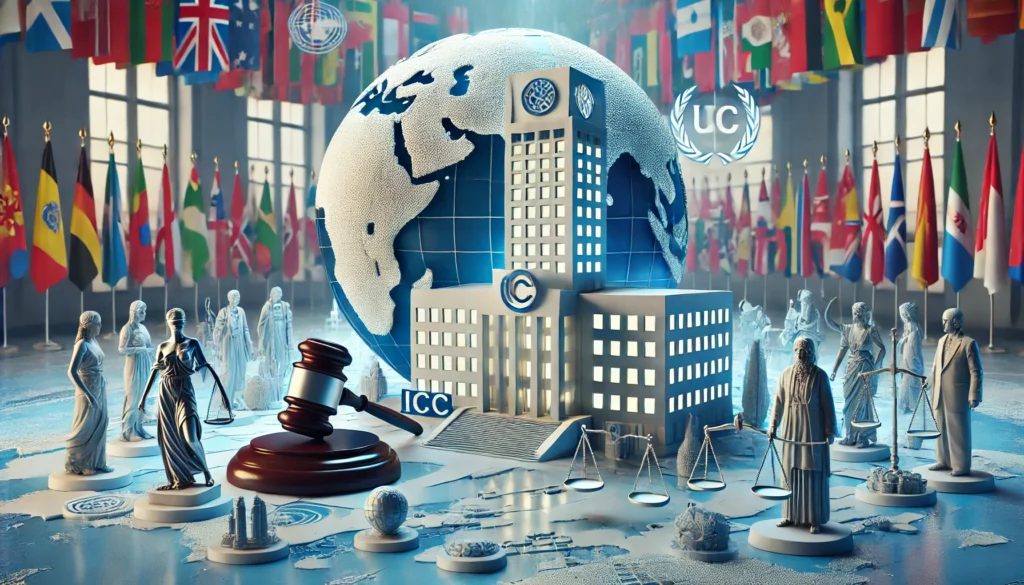Published on 29th July 2025
Authored By: Divyanshi Singh
Bharati Vidyapeeth New Law College Pune
ABSTRACT
The crime of genocide uniquely positions itself inside international criminal law because it alone codifies the offense intending to destroy protected groups in whole or in part. This article gives an institutional and doctrinal analysis of the legal structure governing genocide, with specific focus on the 1948 Genocide Convention, the International Criminal Court’s Rome Statute, and related case law from the ICJ (International Court of Justice, and the ICTY (International Criminal Tribunal for the former Yugoslavia). It critically examines the interpretative challenges that surround the elements of the crime, especially because ‘dolus specialis’ (specific intent) is required, then assesses how legal thresholds evolved to attribute responsibility to people as well as states. The article explores the procedural and structural limitations within international legal institutions when they address genocide which includes issues of jurisdiction, enforcement, and political interference. The discussion then turns to the Indian legal landscape, and identifies some important gaps in domestic implementation. India did not proceed to ratify the Genocide Convention, and there is no legislation that enables prosecution of acts of genocide. The article analyzes comparative law along with references case studies to underscore the need for normative reforms. The article does also advocate for institutional reforms so as to strengthen the global response that is needed for genocide and argues India should proactively engage in aligning its domestic legal framework with its international obligations.
INTRODUCTION
Etymologically the word genocide is derived from the Greek word genos (race/ tribe) and the Latin -cide (killing). It was coined by Polish jurist Raphael Lemkin in 1944 with a view toward describing actions aimed at the deliberate and systematic destruction of a national, racial, or religious group. The world’s worst case of genocide on record is arguably that of the Nazis’ killing of nearly six million Jews during World War II, a disaster that led to the need by the world community to address the legal vacuum over acts of that nature.
The atrocities that were inflicted during World War II on a scale and with a degree of inhumanity that shocked mankind, made it essential for the community of nations to take measures to outlaw and punish genocide. From this was born the Convention on the Prevention and Punishment of the Crime of Genocide (“Genocide Convention”), which was adopted by the United Nations General Assembly on 9 December 1948. Heralding a watershed in the history of international human rights and criminal law, the Convention is the first treaty adopted by the UN, and has become the bedrock of modern international law.
The Genocide Convention makes genocide a crime under both customary international law and international treaty law, and it states that genocide can take place in either war or peace. Its parameters are encoded in the following three paragraphs of international sources–including, in particular, the 1998 Rome Statute of the International Criminal Court (ICC) itself-making it clear that genocide is now very much a crime of intention.
Indeed, the Convention places positive duties on the States not only not to carry out genocide, but to take measures to prevent and repress it. Article IV of the Convention explicitly states that persons, including heads of state, public officials and private individuals, who commit genocide are to be punished. These responsibilities are viewed as an expression of customary international law, applicable to all States, regardless of whether they have ratified a formal Treaty.
Every year, on 9 December, the international community commemorates the International Day of Commemoration and Dignity of the Victims of the Crime of Genocide and of the Prevention of this Crime, in commemoration of the anniversary of the adoption of the 1948 Convention on the Prevention and Punishment of the Crime of Genocide, highlighting the international community’s commitment to the principle of “never again”.
THE PROGRESSION OF GLOBAL NORMS AND INSTITUTIONS RELATING TO GENOCIDE
The world’s attempts to respond to horrifying acts of genocide have shaped legal procedures over time. During the first half of the 20th century, there were no means to hold anyone accountable for mass violence, including the Armenian genocides during World War I. Following World War II, and the Nuremberg Trials between 1945 and 46, the concept of criminal individual responsibility, including for heads of state, was introduced. This tried to stem the tide of state-sponsored-power abuses. Still, genocide was not legally defined and only mentioned in the indictments and judgments.¹
Genocide underwent legal crystallization with the Convention on the Prevention and Punishment of the Crime of Genocide adopted in 1948. It was the first time the term genocide was legally defined under international law, and countries were bound to prevent and punish such acts. Regardless, enforcement was non-existent for decades. It was not until after the brutal genocides in Rwanda and the former Yugoslavia that the international community decisively acted in the 1990s. Justice was served through the ICTR and ICTY tribunals.
The turning point in the international prosecution of genocide came with the landmark case of Prosecutor v. Akayesu before the International Criminal Tribunal for Rwanda (ICTR) in 1998. For the first time, an international court handed down a conviction for genocide, and notably, it expanded the legal interpretation of the crime to include acts of sexual violence. The tribunal recognized that rape and sexual assault were not incidental, but rather integral methods of destroying a targeted group—offering a profound shift in how genocide could be understood and prosecuted.
A few years later, in 2001, the International Criminal Tribunal for the former Yugoslavia (ICTY) echoed this deepening interpretation in Prosecutor v. Krstić, where it formally recognized the massacre at Srebrenica as an act of genocide. This judgment further cemented the relevance and enforceability of the Genocide Convention in post-conflict accountability.
The establishment of the International Criminal Court (ICC) through the adoption of the Rome Statute in 1998 represented another significant milestone. For the first time, the international community had a permanent tribunal with the mandate to prosecute individuals for genocide, among other serious crimes. Article 6 of the Statute directly incorporates the Genocide Convention’s definition, reinforcing consistency in legal standards across jurisdictions.
Meanwhile, issues of state responsibility—as opposed to individual criminal liability—have been addressed by the International Court of Justice (ICJ). In its 2007 judgment in Bosnia and Herzegovina v. Serbia and Montenegro, the ICJ acknowledged that the killings at Srebrenica constituted genocide. It also clarified that states are obligated not only to refrain from committing genocide themselves but to take all measures within their power to prevent and punish it. Crucially, the Court set a high evidentiary bar for proving state complicity, distinguishing it from the standard used to assess individual guilt.
GAPS AND CRITIQUES IN INTERNATIONAL JUSTICE: A LEGAL EXAMINATION
Although the Rome Statute of 1998 marked a historic commitment to combat impunity by establishing the International Criminal Court (ICC), the international justice system still faces significant obstacles. Selective prosecution is one of the most enduring criticisms. A disproportionate amount of the ICC’s initial investigations have concentrated on African nations, including Sudan, Uganda, and the Democratic Republic of the Congo. This has led to accusations that international justice systems reinforce geopolitical bias instead of unbiased accountability.¹The absence of enforcement mechanisms is another significant drawback. To carry out its warrants, the ICC lacks a permanent police force and military power. It must rely on state cooperation, which is frequently erratic or non-existent, particularly in politically delicate situations.²
INDIA AND GENOCIDE: A CRITICAL GAP
India’s handling of the genocide issue shows a clear gap between its international obligations and domestic laws. Although India was one of the first signatories to the Convention on the Prevention and Punishment of the Crime of Genocide in 1948, India has ratified the treaty. This means that India has legal obligations under international law and has to enact any domestic law that defines and criminalizes genocide in accordance with international norms.
Therefore, acts of mass violence have been prosecuted under more general provisions of the Indian Penal Code (IPC). Notable instances include the 1984 anti-Sikh riots, the 2002 Gujarat violence, and more recently, the communal clashes. Although there was rampant, targeted violence directed towards specific communities in these events, the lack of a legal framework to define genocide hinders the recognition of such acts, the pursuit of justice, or holding perpetrators accountable in a comprehensive manner.
The absence of such legislation reflects political and societal dynamics. The legal term ‘genocide’ entails grave moral and political ramifications, especially for state officials, which makes it politically uncomfortable to deal with, especially when state agents or majoritarian politics are involved.
CONCLUSION
Genocide is one of the most serious international crimes that can be committed, as it attacks the core values of human civilization and international legal order. The world has undergone a gradual transformation towards legal accountability for genocide beginning with conceptual emergence of genocide through the horrors of World War II, then its codification in the 1948 Genocide Convention and later, through jurisprudence from the ICTR, ICTY and ICC. There are still persistent gaps within this system, including jurisdictional boundaries, politically motivated enforcement—or lack thereof—and stagnation all working against the ideal of neutral justice.
International courts have not been entirely unproductive. They have expanded the doctrine of genocide by including sexual violence as an act of genocide and made a doctrinal distinction between responsibility of a state and individuals. Nonetheless, structural and procedural challenges stubbornly remain. In my view, the ICJ’s ruling in Bosnia v. Serbia raised an unreasonable evidentiary burden in establishing state complicity while the ICC grapples with questions of legitimacy because of its selective enforcement and prosecutorial policies.
India’s place inside this worldwide structure gives still another cause for worry. As a democratic country with strong legal system, India’s not ratifying the Genocide Convention or passing legislation targeting genocide means a serious normative vacuum. Both conceptually and practically, dependence on the IPC to address mass atrocities is inadequate as it lacks the definitional clarity and intention needed to properly prosecute genocidal acts.
India has to rethink its strategy if it is to satisfy its constitutional promise and increasing global responsibilities. Approving the Genocide Convention and passing a specific Genocide Crimes Act would not only align national legislation with international norms but also show India’s dedication to justice, human dignity, and the prevention of mass atrocities. Domestic inaction on such egregious offenses risks both moral and legal isolation in an ever more connected world. Thus not only necessary, but also urgent is strengthening of national and international systems.
REFRENCES
- Convention on the Prevention and Punishment of the Crime of Genocide, 78 U.N.T.S. 277, entered into force 12, 1951. https://ihl-databases.icrc.org/en/ihl-treaties/genocide-conv-1948
- Rome Statute of the International Criminal Court, July 17, 1998, 2187 U.N.T.S. 90.
- N. Office on Genocide Prevention and the Responsibility to Protect, https://www.un.org/en/genocideprevention
- N. Treaty Collection, Status of the Genocide Convention, https://treaties.un.org
- Prosecutor v. Akayesu, Case No. ICTR-96-4-T, Judgment (Sept. 2, 1998).
- Prosecutor v. Krstić, Case No. IT-98-33-T, Judgment (Aug. 2, 2001).



